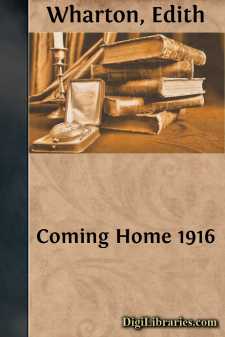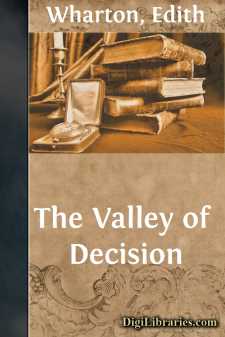Categories
- Antiques & Collectibles 13
- Architecture 36
- Art 48
- Bibles 22
- Biography & Autobiography 813
- Body, Mind & Spirit 142
- Business & Economics 28
- Children's Books 17
- Children's Fiction 14
- Computers 4
- Cooking 94
- Crafts & Hobbies 4
- Drama 346
- Education 46
- Family & Relationships 57
- Fiction 11829
- Games 19
- Gardening 17
- Health & Fitness 34
- History 1377
- House & Home 1
- Humor 147
- Juvenile Fiction 1873
- Juvenile Nonfiction 202
- Language Arts & Disciplines 88
- Law 16
- Literary Collections 686
- Literary Criticism 179
- Mathematics 13
- Medical 41
- Music 40
- Nature 179
- Non-Classifiable 1768
- Performing Arts 7
- Periodicals 1453
- Philosophy 64
- Photography 2
- Poetry 896
- Political Science 203
- Psychology 42
- Reference 154
- Religion 513
- Science 126
- Self-Help 84
- Social Science 81
- Sports & Recreation 34
- Study Aids 3
- Technology & Engineering 59
- Transportation 23
- Travel 463
- True Crime 29
Edith Wharton
Edith Wharton (1862-1937) was an American novelist and short story writer best known for her works exploring the lives and morals of the American upper class, including her Pulitzer Prize-winning novel "The Age of Innocence." Her writing style combined keen social observation with vivid, detailed prose, making her a significant literary figure of the early 20th century. Wharton was also an accomplished designer, traveler, and the first woman to win the Pulitzer Prize for Fiction.
Author's Books:
Sort by:
by:
Edith Wharton
I "Undine Spragg—how can you?" her mother wailed, raising a prematurely-wrinkled hand heavy with rings to defend the note which a languid "bell-boy" had just brought in. But her defence was as feeble as her protest, and she continued to smile on her visitor while Miss Spragg, with a turn of her quick young fingers, possessed herself of the missive and withdrew to the window to read...
more...
by:
Edith Wharton
Mrs. Ballinger is one of the ladies who pursue Culture in bands, as though it were dangerous to meet alone. To this end she had founded the Lunch Club, an association composed of herself and several other indomitable huntresses of erudition. The Lunch Club, after three or four winters of lunching and debate, had acquired such local distinction that the entertainment of distinguished strangers became...
more...
by:
Edith Wharton
The young men of our American Relief Corps are beginning to come back from the front with stories. There was no time to pick them up during the first months—the whole business was too wild and grim. The horror has not decreased, but nerves and sight are beginning to be disciplined to it. In the earlier days, moreover, such fragments of experience as one got were torn from their setting like bits of...
more...
by:
Edith Wharton
PART I It is not often that youth allows itself to feel undividedly happy: the sensation is too much the result of selection and elimination to be within reach of the awakening clutch on life. But Kate Orme, for once, had yielded herself to happiness; letting it permeate every faculty as a spring rain soaks into a germinating meadow. There was nothing to account for this sudden sense of beatitude; but...
more...
by:
Edith Wharton
"Oh, there IS one, of course, but you'll never know it." The assertion, laughingly flung out six months earlier in a bright June garden, came back to Mary Boyne with a sharp perception of its latent significance as she stood, in the December dusk, waiting for the lamps to be brought into the library. The words had been spoken by their friend Alida Stair, as they sat at tea on her lawn at...
more...
by:
Edith Wharton
I Stilling, that night after dinner, had surpassed himself. He always did, Wrayford reflected, when the small fry from Highfield came to dine. He, Cobham Stilling, who had to find his bearings and keep to his level in the big heedless ironic world of New York, dilated and grew vast in the congenial medium of Highfield. The Red House was the biggest house of the Highfield summer colony, and Cobham...
more...
by:
Edith Wharton
THE OLD ORDER. Prima che incontro alla festosa fronteI lugubri suoi lampi il ver baleni. 1.1. It was very still in the small neglected chapel. The noises of the farm came faintly through closed doors—voices shouting at the oxen in the lower fields, the querulous bark of the old house-dog, and Filomena's angry calls to the little white-faced foundling in the kitchen. The February day was closing,...
more...
by:
Edith Wharton
"You ought to buy it," said my host; "its Just the place for a solitary-minded devil like you. And it would be rather worth while to own the most romantic house in Brittany. The present people are dead broke, and it's going for a song—you ought to buy it." It was not with the least idea of living up to the character my friend Lanrivain ascribed to me (as a matter of fact, under...
more...
by:
Edith Wharton
I Having begun my book with the statement that Morocco still lacks a guide-book, I should have wished to take a first step toward remedying that deficiency. But the conditions in which I travelled, though full of unexpected and picturesque opportunities, were not suited to leisurely study of the places visited. The time was limited by the approach of the rainy season, which puts an end to motoring over...
more...
by:
Edith Wharton
Chapter 1 Selden paused in surprise. In the afternoon rush of the Grand Central Station his eyes had been refreshed by the sight of Miss Lily Bart. It was a Monday in early September, and he was returning to his work from a hurried dip into the country; but what was Miss Bart doing in town at that season? If she had appeared to be catching a train, he might have inferred that he had come on her in the...
more...











